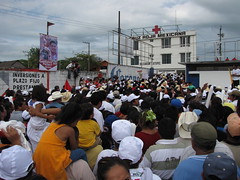
Priístas head for the exits after a June 26 campaign rally in Tuxtepec, Oaxaca, featuring State of Mexico Gov. Enrique Peña Nieto.
Federico Arreola, whose incessant tweets - almost all of the anti-Calderón, pro-López Obrador variety - can be insufferable, often pens excellent columns for Sendero del Peje, a news organization with obvious López Obrador sympathies.
In his July 1 column, he calls the June 28 assassination of Institutional Revolutionary Party (PRI) gubernatorial candidate Rodolfo Torre Cantú in Tamaulipas the party's only significant "campaign act" in any of the 12 state and local elections scheduled for July 4.
A series of leaked phone conversations, suggesting improper campaign meddling and use of social programs for electoral purposes by PRI governors, had cast an unfavourable light on the PRI in some of its most notorious bastions of retrograde politics such as Veracruz and Oaxaca. Now, instead of being viewed as presiding over evil empires and stopping at nothing to retain power, the PRI has some sympathy on its side.
Additionally, the assassination is expected to diminish voter turnout - a factor that always benefits the PRI.
"Fear," Arreloa wrote, "Works in favor of the PRI."
The party depends heavily in many states on its "voto duro" (firm vote) of loyalists, campesinos, unionized workers and government employees - whose jobs depend on the PRI retaining power. The voto duro, along with those lured by its vote-buying schemes and motivated by coercion, is usually enough to win (at the ballot box) unless voter turnout is hight.
The PRI, it must be said, knows how to turn out its vote and is famed in places such as Oaxaca for its year-round organizing and ability to ingratiate itself into the life of every small town and ejido in the state. As one priísta in Oaxaca told me recently, "The PRI organizes all the time. The other parties start organizing three months before an election."
Another factor to watch is the dependability of the PRI vote. As political science professor Federico Estévez of ITAM is fond of pointing out: The PRI vote has stayed roughly the same over the years, while the PAN and PRD votes have varied. The only exception to that might have been the 2006 presidential election, when the party had an unpopular candidate and many priístas drifted over to the campaigns of PRD candidate Andrés Manuel López Obrador and the PAN.
Expect the PRI's voto duro to deliver on July 4 and the PAN and PRD votes to remain low.

No comments:
Post a Comment